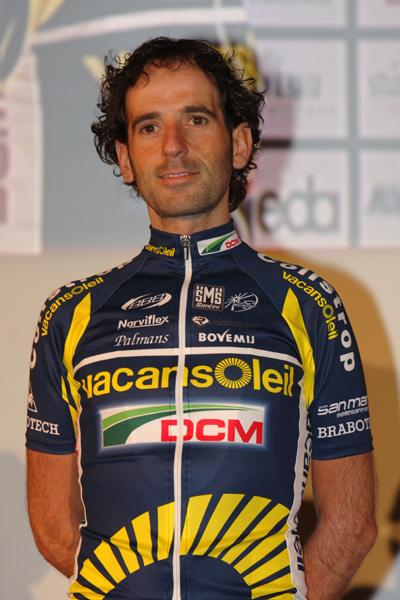Mosquera to be given two-year ban
Spanish federation set to hand down maximum penalty after detection of hydroxyethyl starch

The Spanish federation is reported to be on the verge of announcing a maximum two-year ban for Ezequiel Mosquera after hydroxyethyl starch was detected in one of his samples during the 2010 Vuelta a España, where he finished as runner-up. According to the La Voz de Galicia newspaper in Mosquera’s home region, the federation will make an official announcement of the ban before this coming weekend.
In deciding to apply the two-year sanction, the federation has followed the advice it was given in October by the judge overseeing the case. Mosquera’s legal team countered that advice by suggesting that the use of hydroxyethyl starch is only banned if it can be shown it has been administered intravenously and that there was no indication that Mosquera had used the product in this way.
They also pointed out that the substance is found in many products on sale in any supermarket, and that it was most likely that Mosquera had ingested it orally. Mosquera’s lawyers also denied that hydroxyethyl starch, a blood plasma volume expander that can help to dilute blood without decreasing the amount of red blood cells present, could be used as a masking agent for EPO.
However, it appears that neither the presiding judge nor the competitions committee of the Spanish federation have been convinced by the arguments put forward by Mosquera’s legal team.
It remains to be seen what period the sanction will cover. Although Mosquera has not raced since the end of the 2010 Vuelta and signed with the Vacansoleil team for 2011, the 36-year-old Spaniard did not race in the Dutch team’s colours during this past season while the case was ongoing. However, the Spanish federation did not withdraw his licence to race.
Consequently, the federation could decide that Mosquera has been effectively banned for a year and impose a sanction that extends to September 2012. Alternatively, it could conclude that Mosquera has been free to race up to the current point and ban him until the end of 2013. In either case, Mosquera’s career looks likely to end, although he may decide to pursue his cause at the Court of Arbitration for Sport.
The ban could also result in him losing any money that would have been owing to him from his contract with Vacansoleil. Mosquera had told his team that he would not take any salary until the case had been decided in his favour.
Get The Leadout Newsletter
The latest race content, interviews, features, reviews and expert buying guides, direct to your inbox!
Assuming the Spanish federation does confirm this sanction on Mosquera, it will bring into further question the same federation’s decision to hand Oscar Sevilla a six-month ban after the same product was detected in one of his samples. The UCI is challenging that sanction at the CAS.
Peter Cossins has written about professional cycling since 1993 and is a contributing editor to Procycling. He is the author of The Monuments: The Grit and the Glory of Cycling's Greatest One-Day Races (Bloomsbury, March 2014) and has translated Christophe Bassons' autobiography, A Clean Break (Bloomsbury, July 2014).